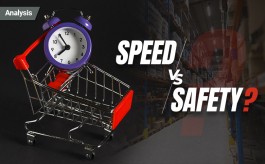What does DMart’s share drop say about Quick Commerce & value retail?
By N Jayalakshmi | October 16, 2024
The reported drop in stock value of Avenue, the company that runs DMart stores, is another indication of the growing impact of Quick Commerce on offline retail in the FMCG segment.

The shares of Avenue Supermarts, the company that runs DMart stores, have reportedly dropped over 8% due to a disappointing Q2 earnings impacted by Quick Commerce surge.
Neville Noronha, CEO and MD of Avenue Supermarts has been quoted as saying, "We clearly see the impact of online grocery formats, including DMart Ready, in large metro DMart stores which operate at a very high turnover per square feet of revenue."
The company’s stock rating has been downgraded to ‘neutral; from ‘overweight’ by JPMorgan and the reason for it being the impact on operating margins from increased investment and Quick Commerce,the effect of which is seen to have been bigger in Q2.
While there have been enough reports in the media and industry bodies that point to the impact of Quick Commerce on General Trade, this latest newsregarding the reduction of stock value of DMart points to newer concerns regarding overall offline retail in the FMCG segment.
DMart, which has presence across the country retailing home essentials and groceries, has always capitalised on its value format, offering heavy discountsand focusing on store expansion. But now the retailer faces the hard-to-ignore growth of Quick Commerce players who are not just promising10-minute delivery of essentials, but also irresistible offers and better still, expanding their services across the country, including tier 2-3 cities. Given this, what is the next step for DMart? Make its own foray into Quick Commerce (after all it already has an online platform)? Collaborate with QC players and convert their stores into Dark Stores? Convert the stores into specialised hubs and shift the focus from value driven essentials to specialised/niche categories with the USP being a unique store experience or community space?
According to IBEF, a compound annual growth rate (CAGR) of 27.9% can be expected for the Indian quick commerce industry. It adds that Quick Commerce is set to change the Indian shopping experience, offering “immediate satisfaction, unmatched convenience, and significant investment and growth prospects for industry stakeholders”.
Meanwhile, it’s time to circle back to the question that loomed large in the aftermath of the pandemic- will e-commerce kill offline retail? The answer has become pretty obviousby now and omnichannel co-existence has emerged to be an accepted way in the retail eco-system. But can the same be said in the wake of the fast rise of Quick Commerce?
Other questions that emerge in the scenario include:
-
How long will the growth of Quick Commerce be sustained? And what will sustain it?
-
Will there be regulations to curtail unfair competition and trade practices?
-
Will offline retailers, particularly GT businesses, need to make tech a critical part of their investments?
-
Will the industry surrounding GT and MT, including suppliers and manufacturers of POP displays and in-store merchandising solutions,start to invest in newer capabilities and explore newer partnerships?









Comments